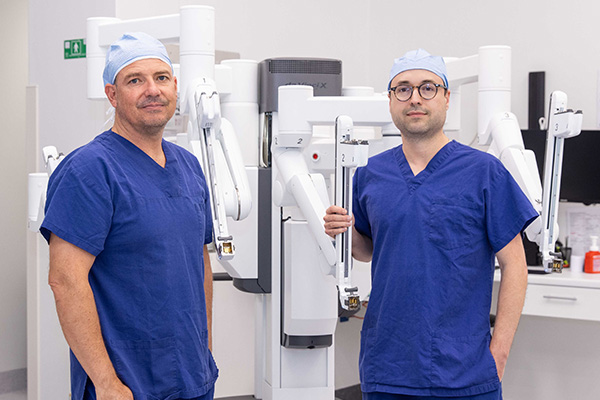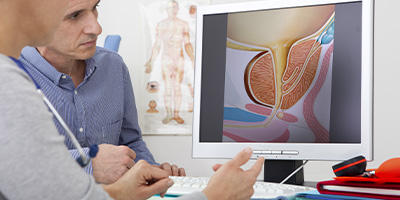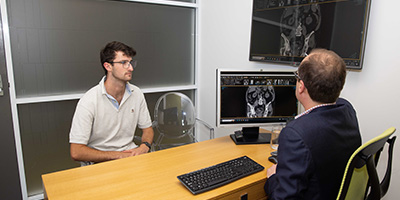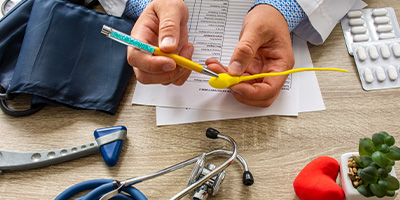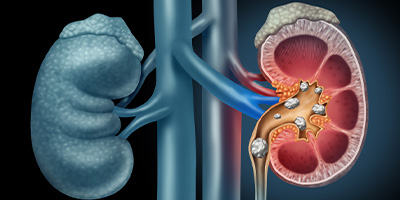Robotic Prostatectomy
About The Procedure
Da Vinci’s robotic surgery is a minimally invasive way to treat prostate cancer. It is globally known as the best surgical treatment for prostate cancer and offers an increasingly well-recognised range of benefits.
Robotic surgery is widely used because of its high degree of surgical accuracy. With the help of the robot, the surgeons operate from a separate console, controlling all robotic arms. It offers the following list of benefits:
- Less pain and blood loss compared to open surgery
- Quicker recovery time
- Rather than one big incision, 6x small 1cm/key-hole incision
- Shorter hospital length of stay
- Superior vision and dexterity for surgeons.
- Shorter period with catheter (IDC)
- Surgeon tremor filtration

Operation
The procedure aims to remove the whole prostate and seminal vesicles (sperm sacs). We use very small robotic instruments that allow precise surgery via keyhole incisions. In some cases, lymph nodes will also be removed. We will discuss this with you before the procedure.
You will be anaesthetised by a doctor with expertise in robotic surgery. That will increase the safety of your procedure. It takes around 1h30 to 2h00 but you will certainly spend more time in the operating theatre. We will contact your family members at the end of your surgery to reassure them that things went well. Immediately after the operation, you will stay in the recovery room until you are fully awake and pain-free. Only after that, you will be transferred to the ward. All the urine will be coming out through the catheter, so you don’t need to stand or walk immediately. The catheter will be in place for 7 days.
On the following day, we will encourage you to walk, learn how to manage the urinary bag and also do breathing exercises. You will receive painkillers and also laxatives to help recover bowel function.
During the admission nurses and continence nurses will ensure you will be comfortable in your recovery time and you will be discharged confident on how to manage your urinary catheter bag. We encourage family support when possible.
Regarding your continence, unless the patient has a very advanced disease, Da Vinci surgery delivers greatly improved post-surgical continence compared to traditional methods. Most men will experience a degree of incontinence immediately after surgery but will no longer need continence pads after 6 months. Less than 5% will require any further surgery for severe urinary leak/incontinence.
Erectile dysfunction after surgery depends on several factors. Our surgeons will discuss the possibility of erection nerve-sparing based on your case characteristics. Each case is different and will allow different levels of nerve preservation. We promote individualised medicine and we will plan/tailor your case according to your needs.

Post Surgery
You will be discharged when you are fully confident and independent in managing the urinary bag. The continence nurse will book an appointment for you to get your urinary catheter removed and you will be seen by our team 3 weeks after the operation. We will check how you are doing and also discuss the final pathology report (we send the whole prostate for analysis after surgery).
After the surgery, we expect your PSA (blood test) to go down to very low or undetectable levels. First PSA will be tested 12 weeks after the operation. A follow-up, for at least 10 years will be required, as patients could experience recurrence after any treatment (as any other different type of cancer).
We hope you can regain your continence quickly. We know it can improve little by little up to 12 months after the surgery.
A post-surgical penile rehabilitation will be offered, which will also increase the chance of maintaining sexual function after surgery. It involves treatment with tablets or injections (only if needed).
Having the surgery as the first treatment (especially for young patients) brings the possibility of reserving radiotherapy as a backup plan for an eventual recurrence in the future. Patients with advanced disease or high-risk disease might need multimodal (more than one modality) treatment. That will also be discussed with you.
For more information about your procedure please read through the information from The British Association of Urological Surgeons (BAUS).
Additional Resources
Robotic - Assisted Laparoscopic Radical Prostatectomy (RALP)
Information about your procedure from The British Association of Urological Surgeons (BAUS)
Robotic Prostatectomy Process
What's on this page
Other Services
